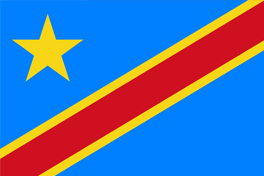 |
République démocratique du CongoIndependence 30 June 1960
History The Democratic Republic of Congo (DRC) is Africa's third largest country – 60% of which is covered by equatorial forest – and the francophone world's most populous state. Its ancient history is long and rich. The slave trade removes millions. The colonial period, however brief, exerts enduring political, economic and cultural influence. The Congo Free State of King Leopold II exploits natural resources such as ivory and rubber, using means that take a heavy human toll. In 1908, Congo becomes a Belgian colony. Administration, territorial control, industrialization and evangelization of the population by many religious congregations develop during the interwar period. After the Second World War, economic and social development is emphasized, especially infrastructure, education and health care. In 1957 and 1958, the first communal elections mark the beginning of the political emergence of Congolese elites – not without causing significant tensions between different communities – and political parties replace cultural associations; from this moment, the nationalist awakening strengthens and spreads. In January 1959, riots erupt in Leopoldville and are violently suppressed by the Force Publique. King Baudouin promises independence to the Congolese, and it is granted on 30 June 1960. Joseph Kasavubu becomes president and Patrice Lumumba prime minister. Immediately, Katanga, led by Moïse Tshombe, secedes, followed by Kasai, led by Albert Kalonji. The central government appeals to the UN. The Kasavubu-Lumumba rivalry ends with the assassination of Lumumba – seen as too close to the communist bloc at the height of the cold war – with the complicity of the United States, Belgium, Leopoldville (Kinshasa) and Katanga. Civil war engulfs the country. In November 1965, General Mobutu takes power. In May 1997, Laurent Désiré Kabila becomes president with the support of African allies and the international community. His son Joseph succeeds him in 2002. Since August 1998 to the present day, the DRC has been racked by war, leaving millions dead. Zana Aziza Etambala (RMCA) |


